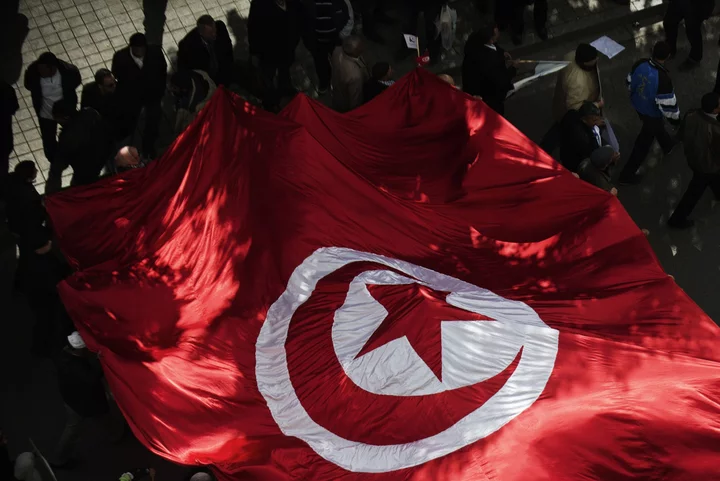Tunisia’s President Kais Saied replaced his prime minister of almost two years with a little-known figure, injecting fresh uncertainty into a deal that was hashed out by the government to secure a $1.9 billion lifeline from the International Monetary Fund.
Saied appointed Ahmed Hachani after deciding to “end the duties” of Najla Bouden, the Arab world’s first female prime minister, the Tunisian presidency said in a statement on its Facebook page on Tuesday. It didn’t provide reasons for Bouden’s dismissal.
The change caught the market off guard as investors, unnerved by the state of Tunisia’s finances, spent months waiting for the final approval of the IMF deal.
Tunisia’s dollar notes maturing in January 2025 fell after Saied’s announcement. The yield on the North African nation’s bond due 2025 rose the most in nearly two months.
The future of the bailout deal is still up in the air since the fund’s directors have yet to sign off on the pact reached last October. With the country mired in a worsening crisis, Hachani needs to move quickly to achieve a breakthrough that hinges on additional support from Tunisia’s allies and the government’s implementation of measures required to access funds.
Saied, who assumed broader powers in 2021, has stoked worries about Tunisia’s risk of default by opposing spending cuts and other policies necessary to get the money.
“This ongoing churn in Kais Saied’s government shows the extent of his chaotic rule,” said Intissar Fakir, director of the Middle East Institute’s North Africa program. “I suspect Bouden was acting out of a desire for public service — no doubt she did her best to make policies of Saied’s populist politics but she had little leeway, and influence.”
Few details were immediately available about the new prime minister. Local media reported that Hachani had worked as legal affairs director at the central bank and also served at the Finance Ministry before retiring. He also taught at Tunis University’s faculty of law, where Saied once taught.
A newspaper that serves as the mouthpiece of Tunisia’s largest trade union said it’s “never heard about this man.” Hachani is expected to lean on his banking expertise in talks with the IMF and other lenders and also to address “the liquidity issue” to ensure the country is supplied enough with staples such as wheat, the newspaper Echaab said Wednesday.
Read: Tunisia Gets Surprise $500 Million From Saudi Amid IMF Delay
The shake-up is far from an outright surprise. Saied has repeatedly indicated his displeasure with the government, especially in addressing months-long and worsening shortages of staples such as bread and in tackling what he often described as foes, saboteurs and corrupt officials within the state.
Bouden, a soft-spoken former petroleum engineer, seldom made public remarks or sat for an interview. Besides cabinet meetings, Bouden’s appearances were limited to conferences — including at the Davos economic forum — and silently listening at long meetings with Saied.
Given Saied’s sway, Bouden was “more a coordinator” of the executive branch than a prime minister, opposition leader Ahmed Najib Chebbi told the private IFM radio. “What we know is that she did nothing,” he said.
The IMF has waited months for Bouden’s government to submit a revised package of reforms and spending cuts.
But Saied threw the deal into doubt, rejecting what he termed as “diktats” of spending cuts by the Washington-based lender that could add more instability and hardship for Tunisians.
After supervising a brief swearing-in ceremony, Saied urged unity behind his leadership and instructed Hachani to “preserve our homeland, our state and the civil peace in our society” amid what he described “major challenges that we have to overcome.”
“The Tunisian state is one, many should remember that,” Saied said in a video posted on the presidency’s Facebook page.
While Tunisia’s political system may have become “a hyper-presidential regime” under Saied, people are blaming the government and the opposition — not the president — for more than a decade of economic decline, said Youssef Cherif, a political analyst who directs the Columbia Global Centers in Tunis.
“It is possible that the president, by appointing someone he trusts and that no one knows, is trying to show that he listens to his people and to defuse tensions,” Cherif said. “Nevertheless, there won’t be any major changes in government and policy.”
(Updates with market reaction in fourth paragraph.)

